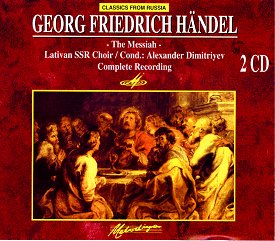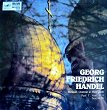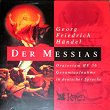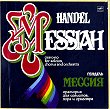| RECORDINGS |

|
| LABEL: |
ZYX
/ MELODIYA |
| CATALOG
NUMBER: |
MEL
45502-2 |
| UPC
NUMBER: |
090204105083 |
| NUMBER OF DISCS: |
2 |
| RUNNING TIME: |
69:38,
68:28 |
| YEAR
RECORDED: |
1982 |
| CD
RELEASE DATE: |
1993 |
| CONDUCTOR: |
ALEXANDER
DIMITRIYEV |
| ORCHESTRA: |
LENINGRAD
PHILHARMONIC
SYMPHONY ORCHESTRA |
| CHOIR: |
LATIVAN
SSR CHOIR |
| SOPRANO: |
LOUISA
ANDRUSEVICH |
| MEZZO-SOPRANO: |
LUDMILLA
FILATOVA |
| TENOR: |
KARLIS
ZARLINS |
| BARITONE: |
SERGEJ
LEIFERKUS |
|
|
| AUDIO SAMPLES |
HIGHLIGHTS |
OTHER
RELEASES |
|
|
 

|
|
DISC ONE
1. Sinfonia: Grave- Allegro moderato
2. Troste dich mein Volk, spricht dein
Gott
3. Alle Tale macht hoch erhaben
4. Denndie Herrlichkeit Gottes, des Henn
wM offenbare
5. So spricht der Herr, Gott Zeboath
6. Doch wer wird ertragen den Tag seiner
Ankunft?
7. Und erwird reiningen und lautern das
Volk
8. Denn sieh, der Verheissene des Herrn
erscheint auf Erden
9. O du, die Wonne verkiindet in Zion
10. O du, die Wonne verkundest in Zion
11. Denn blick auf: Finsternis deckt alle
Welth
12. Das Volk, das da wandelt im Dunkel
13. Denn es ist uns ein Kind geboren
14. Hirtenmusik/ Pastoral Symphony
15. Es waren Hirten beisammen auf dem
Felde
16. Und siehe, der Engel des Herrn trat zu
ihnen
17. Und der Engel sprach zu ihnen:
Furchtet euch nicht
18. Und alsbald war da bei dem Engel die
Menge der himmlischen Heerscharen
19. Ehre sei Gott in der Hone
20. Erwach, frohlocke, o Tochter von Zion
21. DannwirddasAugedes Blinden sich auftun
22. Er weidet seine Herde, dem Hirten
gleich
23. Joch ist sanft, die Last ist leicht
24. Seht an das Gotteslamm
|
DISC TWO
1. Wahrlich, ertrug unsere Qual
2. Durch seine Wunden sind wir geheilet
3. Der Herde gleich, vom Hirten fern
4. Und alle, die ihn sehen, sprechen ihm
Hohn
5. Ertraute Gott, daB erwurd erretten ihn
6. Diese Schmach brach ihm sein Herz
7. Schau hin und sieh, wer kenne solche
Qualen
8. Er ist dahin aus dem Lande des lebens
9. Doch du liessestihnim Grabe nicht
10. Hoch tut euch auf und offnet euch weit
11. Der Herr gab das Wort
12. Wie lieblich ist der Boten Schritt
13. Warum denn rasen und toben die Harden
im Zome
14. Auf, zerreisset ihre Bande
15. Der da thronet im Himmel
16. Du zerschlagst sie mit dem eisernen
Zepter
17. Hallelujah, denn Gott, der Herr,
regieret allmachtig
18. Ich weiB, daB mein Erioser lebet (1.
Teil)
19. Ich weiB, daB mein Erioser lebet, denn
Christ ist erstanden von dem Tod (2. Teil)
20. Wie durch einen der Tod
21. Vernehmt, ich kiind' ein Geheimnis an
22. Sie schallt, die Posaun', und die
Toten erstehn unverweserlich
23. Wenn Gott ist fur uns
24. Wurdig ist das Lamm, das da start)
25. Amen
|
|
SITE RATING: 6/10
SITE
REVIEW: Being the
first Russian performance of Der Messias
that I've heard, and recorded in the last
years of the Cold War, I was curious to see if
the Russian choral tradition would have an
influence on this recording of Handel's
English oratorio. The answer: a BIG yes - not
only in the choral sound, which is dense and
sonorous, but also a distinctly Soviet flavor
saturates this recording in surprising,
unexpected ways. The sound of the
Lativan Supreme Soviet Republic Choir,
(who hailed from the Ukraine), is thick; more
earthy and grounded than their European or
American counterparts - a quality no doubt
fathered by their rich folk music heritage.
The tempos set by Director Alexander
Dimitriyev are much more deliberate and
weighty than I'd heard before, even on other
Germanic Messias.
The Leningrad Philharmonic Symphony
Orchestra drones, rather than dances.
But the distinctiveness of this
performance goes deeper: There's a rugged
humanity to this performance that's unique - a
taste of nationalistic fervor found in
the interpretation that's tonally apart from
any other performance. Part of the
effect is created by the equal weight that's
given each note; there's little in the way of
dynamic subtlety here - it's as if the
performers are giving a manifesto; a raging
against the coming of the dark - there's a
definite germ of T. S. Eliot's The Waste Land
to this Messias,
which, although it's distinctive and curious -
doesn't really work for this piece. The
combined forces creates fireworks during
"Since By Man Came Death" helped out by that
chorus's dynamic extremes, but fails to
convince in the "Hallelujah" or "Worthy Is The
Lamb" - there's little heartfelt joy and
rejoicing in these tracks. The soloists are
equally problematic, with tenor Karlis Zarlins
chewing his way through the German text as if
he's trying to 'out-German' the Germans - he
carries a proud, confrontational manner
- a subtly disturbing quality that has to
be heard to be fully appreciated; soprano
Louisa Andrusevich is cool and detached; mezzo
Ludmilla Filatova gives a hard, flint-like
edge to her arias, while baritone Sergej
Leiferkus sounds as if he's simply trying too
hard, punching out everything in a performance
that I found grating. Much of this
recording I would classify as having a
'hammer-like' quality - blunt, deft strokes
raining down on the listener, definitely
leaving an impression, but lacking in deeper,
finer feeling.
|
|




